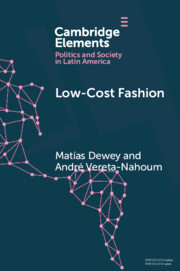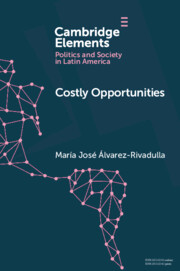Latin American politics and society are at a crossroads, simultaneously confronting serious challenges and remarkable opportunities that are likely to be shaped by formal institutions and informal practices alike. The new Politics and Society in Latin America Cambridge Elements series will offer multidisciplinary and methodologically pluralist contributions on the most important topics and problems confronted by the region.
The series seeks two types of contributions (averaging 25,000 words in length): 1) state of the art and agenda-setting pieces, primarily by established scholars in the field; and 2) empirically rich contributions on cutting-edge and emerging topics in Latin American politics and society. The series’ intended audiences are faculty, students, and practitioners.


About the Editors
Maria Victoria Murillo is Professor of Political Science and International Affairs at Columbia University. She received her BA from the Universidad de Buenos Aires and her PhD from Harvard University. She is the author of Labor Unions, Partisan Coalitions, and Market Reforms in Latin America (Cambridge University Press 2001) and Political Competition, Partisanship, and Policymaking in the Reform of Latin American Public Utilities (Cambridge University Press, 2009). She is also editor of Carreras Magisteriales, Desempeño Educativo y Sindicatos de Maestros en América Latina (Flacso 2003), and co-editor with Steven Levitsky of Argentine Democracy: the Politics of Institutional Weakness (Pennsylvania State University Press, 2005), and with Mario Pecheny and Roberto Gargarella of Discutir Alfonsín (Siglo XXI 2010). She has published in edited volumes as well as in the American Journal of Political Science, World Politics, Comparative Political Studies, Comparative Politics, World Development, Latin American Research Review, Desarrollo Economico, and Foro Internacional, among others.
Juan Pablo Luna is Professor of Political Science at the Pontificia Universidad Católica de Chile. He received his BA in Applied Social Sciences from the UCUDAL (Uruguay) and his PhD in Political Science from the University of North Carolina at Chapel Hill. He is the author of Segmented Representation. Political Party Strategies in Unequal Democracies (Oxford University Press, 2014), and has co-authored Latin American Party Systems (Cambridge University Press, 2010). In 2014, along with Cristobal Rovira, he co-edited The Resilience of the Latin American Right (Johns Hopkins University). His work on political representation, state capacity, and organized crime has appeared in the following journals: Comparative Political Studies, Revista de Ciencia Política, the Journal of Latin American Studies, Latin American Politics and Society, Studies in Comparative International Development, Política y Gobierno, Democratization, Perfiles Latinoamericanos, and the Journal of Democracy.
Andrew Schrank is the Olive C. Watson Professor of Sociology and International & Public Affairs at Brown University. He received his BA from the University of Michigan and his PhD from the University of Wisconsin. His articles on business, labor, and the state in Latin America have appeared in the American Journal of Sociology, Comparative Politics, Comparative Political Studies, Latin American Politics & Society, Social Forces, and World Development, among other journals, and his co-authored book, Root-Cause Regulation: Labor Inspection in Europe and the Americas, is forthcoming at Harvard University Press.
Areas of interest
Contemporary Latin America faces profound challenges and opportunities: authoritarian enclaves in nascent democracies, distributive conflict amidst declining socioeconomic inequality, environmental crisis and reform, and continuous attempts at reforming institutions and incorporating new forms of citizenship. In light of these historical transformations, the series aims to address perennial questions on the origins of social and political order; the salience and character of ethnic and national identity; the definition, durability, and force of formal institutions; the evolution and resilience of informal practices; and the relative importance of material and non-material motivations in political and economic behavior, among others. The series welcomes contributions on state-building, democratization, transitional justice, authoritarianism, populism, different forms of inequality, political parties and social movements, identity and gender politics, resource extraction, environmental degradation and sustainability, sub-national governments, violence, organized crime, corruption, informality, governance, urban development, and demographic changes, among other topics.
Contact the editors
If you would like more information about this series, or are interested in writing an Element, please contact the editors:
Juan Pablo Luna: jlunaf@uc.cl
Maria Victoria Murillo: mm2140@columbia.edu
Andrew Schrank: andrew_schrank@brown.edu
Editorial Board
Javier Auyero, University of Texas at Austin
Daniela Campello, Fundação Getúlio Vargas
Eduardo Dargent, Universidad Catolica, Peru
Alberto Diaz-Cayeros, Stanford University
Kathy Hoschtetler, London School of Economics
Evelyne Huber, University of North Carolina, Chapel Hill
Robert Kaufman, Rutgers University
Steven Levitsky, Harvard University
Antonio Lucero, University of Washington, Seattle
Juliana Martinez, Universidad de Costa Rica
Alfred P. Montero, Carlton College
Alison Post, University of California, Berkeley
Gabriel Vommaro, Universidad Nacional de General Sarmiento
Deborah Yashar, Princeton University
Gisela Zaremberg, Flacso México
Veronica Zubilaga, Universidad Simon Boliviar